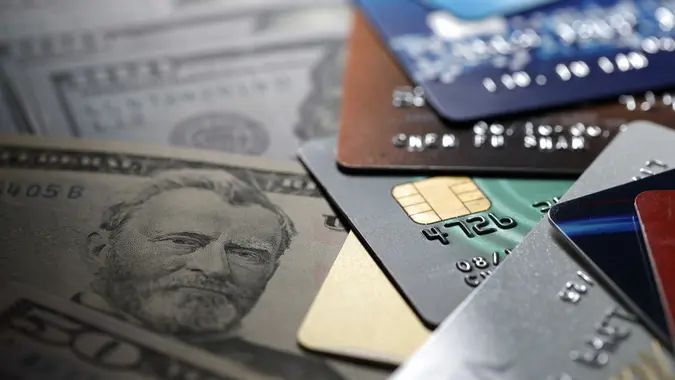How to Use a Credit Card to Build Credit

Commitment to Our Readers
GOBankingRates' editorial team is committed to bringing you unbiased reviews and information. We use data-driven methodologies to evaluate financial products and services - our reviews and ratings are not influenced by advertisers. You can read more about our editorial guidelines and our products and services review methodology.

20 Years
Helping You Live Richer

Reviewed
by Experts

Trusted by
Millions of Readers
Having a credit card can make payments more convenient, but convenience isn’t the only perk of credit cards. Using your credit card builds credit and can improve your credit score in the future.
Keep reading and learn how to improve your credit score by using a credit card.
How to Build Credit With a Credit Card
You can apply for a credit card online and often receive an immediate decision. However, before you start submitting applications, do your research. Different credit cards have different interest rates, fees, credit limits, rewards and other terms.
For example, having a higher credit limit might give you more flexibility to make a large purchase, but it could make it harder for you to control your spending and avoid racking up more charges than you can pay off.
Consider the differences between a store credit card and a bank credit card. According to Experian, one of the credit bureaus, store credit cards are often easier to get approved for than bank credit cards. However, those cards might have higher interest rates and fees.
Depending on your credit history, you might not be approved for the credit cards with the best rewards right from the start, but knowing how to use a credit card to build credit can help you get closer to the more exclusive benefits.
Start With a Secured Credit Card
If you’re not able to qualify for a credit card, consider applying for a secured credit card to help build your credit score. A secured credit card is a credit card with a credit limit equal to the amount of your security deposit.
For example, if you make a $1,000 deposit, you have a credit limit up to $1,000. A secured credit card reports your monthly payments to the credit bureaus, helping to build your credit history so that you can improve your score. As you build your credit history, eventually your credit score can improve so that you can qualify for a regular credit card.
Related: 10 Best Credit Cards for Bad Credit
How Using Your Credit Card Increases Your Credit Score
Applying for a credit card is just the first step when you use credit cards to build credit. Limiting your charges and paying your bill on time will increase your score. Continue to use the credit card responsibly, or you could be putting your credit score at risk.
Your credit score is broken down into five different categories:
1. Payment History
Your payment history is the largest single factor affecting your credit score. For a credit card, that means paying on time each month. Over time, you’ll build up a positive credit history, which boosts your score. If you pay late or miss payments, you’ll damage your score.
2. Amount Owed
The amounts you owe are reported to credit bureaus by your credit card company each month, which might not correlate with your payment due date. With credit cards, Experian recommends keeping your credit usage to less than 30 percent of your credit limit, and lower if possible.
If your credit card has a $5,000 limit, for example, you don’t want your outstanding balance to go above $1,500. As the second-heaviest factor weighing on your credit, it’s crucial to clear your payments owed.
More Info: How Your Credit Utilization Rate Is Affecting Your Credit Score
3. Length of Credit History
There’s no shortcut to building a longer credit history. The sooner you start using credit cards, the sooner you can start building it.
This factor also looks at the average age of your accounts and your oldest open accounts. As a result, closing an old account can hurt your credit score. If you’re not paying an annual fee on the card and want to maximize your credit score, keep it open.
4. Credit Mix
Your credit score improves as you use different types of credit. Types of credit include both retail accounts and credit cards. People who have no record with credit cards tend to be viewed as higher risk than people who have managed credit cards responsibly, according to FICO, the credit score company.
5. New Credit
When you apply for new credit, including credit cards, your lender will pull your credit score. This results in an inquiry on your credit report.
Each hard inquiry lowers your score temporarily. The inquiry remains on your credit report for two years, but its impact on your score declines over time.
Up Next: How to Raise Your Credit Score by 100 Points (Almost) Overnight
 Written by
Written by  Edited by
Edited by 
























